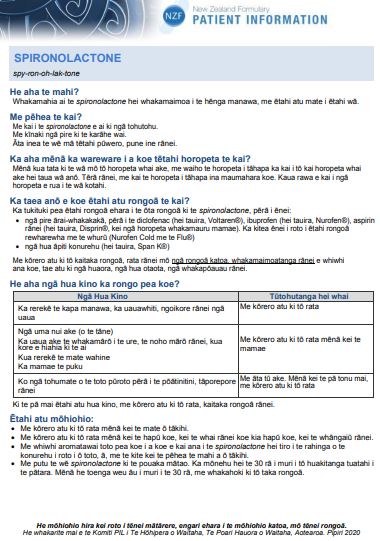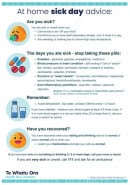Avoid foods with a high potassium content
Spironolactone can increase the potassium levels in your blood (also called hyperkalaemia). This is more common in older adults, if you have heart or kidney problems and in if you are taking other medicines that affect potassium levels.
You should avoid things with a high potassium content, such as 'salt substitutes' or low-sodium salt. You are at increased risk of hyperkalaemia if you:
Blood tests
Your doctor may recommend a blood test to check your potassium level before starting treatment and occasionally during treatment. These checks may be needed more frequently if you have heart or kidney problems or if you take other medicines that affects potassium levels.
Tell your healthcare team if you are taking any other medicines
Spironolactone may interact with some medicines and herbal supplements, so check with your prescriber or pharmacist before starting spironolactone and before starting any new medicines or herbal supplements.
Be careful when taking pain relief medicines
Pain relief medicines called non-steroidal anti-inflammatory pain relief medication (NSAIDs) must be avoided if you have heart failure, as these medicines can make your condition worse. Taking spironolactone with NSAIDs can be very harmful to your kidneys and can cause acute kidney injury. Ask your doctor or pharmacist for a safer pain relief option. Examples of NSAIDs are:
- ibuprofen (Brufen, I-Profen, Nurofen, Maxigesic, Nurofen Cold and Flu, Nuromol)
- diclofenac (Voltaren, Diclohexal)
- naproxen (Noflam, Naprosyn SR)
- mefenamic acid (Ponstan)
- celecoxib (Celebrex).
Have a sick day plan
If you have diarrhoea (runny poo) or you're vomiting (being sick) from a stomach bug, or you're at risk of dehydration for another reason, it’s important to let your doctor know. They may advise you to stop taking spironolactone for a few days and restart it when you feel better. Spironolactone can increase potassium in your blood, which is worse if you are dehydrated.
Pregnant or planning a pregnancy
You should avoid becoming pregnant while you are taking spironolactone. If you are a woman of childbearing age, you should use an effective method of birth control (contraception) during treatment with spironolactone. It is usually safe to conceive a month after stopping the spironolactone treatment. Discuss with your healthcare provider which types of contraception are suitable for you and tell your doctor straight away if you become pregnant while taking spironolactone.









